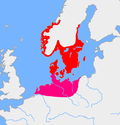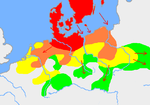the Germanic parent language (GPL), also known as Pre-Germanic Indo-European (PreGmc) or Pre-Proto-Germanic (PPG), is the reconstructed language of the... 11 KB (1,247 words) - 19:35, 5 March 2024 |
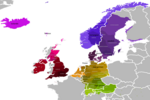 | The Germanic languages are a branch of the Indo-European language family spoken natively by a population of about 515 million people mainly in Europe... 92 KB (9,399 words) - 17:48, 11 April 2024 |
The Germanic substrate hypothesis attempts to explain the purportedly distinctive nature of the Germanic languages within the context of the Indo-European... 14 KB (1,707 words) - 13:34, 8 April 2024 |
 | which there are eight groups with languages still alive today: Albanian, Armenian, Balto-Slavic, Celtic, Germanic, Hellenic, Indo-Iranian, and Italic;... 111 KB (10,129 words) - 10:03, 26 April 2024 |
to project some terms back to the Proto-Germanic period despite their attestation in only one Germanic language; for instance, *saidaz ('magic') is only... 72 KB (1,709 words) - 02:57, 14 December 2023 |
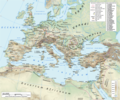 | Burgundians (redirect from Burgundian language (Germanic)) Norse: Burgundar; Old English: Burgendas; Greek: Βούργουνδοι) were an early Germanic tribe or group of tribes. They appeared in the middle Rhine region, near... 33 KB (3,928 words) - 08:13, 30 March 2024 |
Germanic philology is the philological study of the Germanic languages, particularly from a comparative or historical perspective. The beginnings of research... 4 KB (356 words) - 21:40, 9 March 2024 |
Germanic given names are traditionally dithematic; that is, they are formed from two elements, by joining a prefix and a suffix. For example, King Æþelred's... 58 KB (1,339 words) - 01:31, 26 March 2024 |
 | Runes (redirect from Germanic rune) alphabets known as runic alphabets native to the Germanic peoples. Runes were used to write Germanic languages (with some exceptions) before they adopted the... 68 KB (6,930 words) - 17:48, 30 March 2024 |
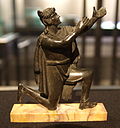 | the use of ancient and early medieval Germanic languages and are thus equated at least approximately with Germanic-speaking peoples, although different... 163 KB (20,172 words) - 13:40, 20 April 2024 |
 | Germanic law is a scholarly term used to describe a series of commonalities between the various law codes (the Leges Barbarorum, 'laws of the barbarians'... 47 KB (5,886 words) - 01:41, 10 April 2024 |
 | In Germanic paganism, the indigenous religion of the ancient Germanic peoples who inhabited Germanic Europe, there were a number of different gods and... 21 KB (696 words) - 18:14, 5 March 2024 |
Germanic kingship is a thesis regarding the role of kings among the pre-Christianized Germanic tribes of the Migration period (c. 300–700 AD) and Early... 9 KB (1,269 words) - 09:42, 31 March 2024 |
 | Teutons (redirect from Teutons (Germanic tribe)) lived in an area associated with early Germanic languages, but not in an area associated with Celtic languages. The ethnonym is attested in Latin as Teutonēs... 15 KB (1,837 words) - 11:36, 25 April 2024 |
Pre-Germanic may refer to the predecessor of Common Germanic, see Germanic parent language a language spoken before the arrival of Germanic speakers during... 285 bytes (67 words) - 02:46, 23 August 2016 |
 | English is a West Germanic language in the Indo-European language family, whose speakers, called Anglophones, originated in early medieval England. The... 225 KB (22,941 words) - 23:37, 22 April 2024 |
 | In Germanic mythology, an idis (Old Saxon, plural idisi) is a divine female being. Idis is cognate to Old High German itis and Old English ides, meaning... 5 KB (690 words) - 20:35, 17 March 2024 |
Romano-Germanic describes the conflation of Roman culture with that of various Germanic peoples in areas successively ruled by the Roman Empire and Germanic... 5 KB (454 words) - 06:54, 6 March 2024 |
conjugation of Germanic strong verbs such as sing/sang/sung. While Germanic umlaut has had important consequences for all modern Germanic languages, its effects... 52 KB (5,283 words) - 23:04, 25 March 2024 |
 | Germanic language spoken predominantly in Sweden and in parts of Finland. It has at least 10 million native speakers, the fourth most spoken Germanic... 80 KB (8,486 words) - 19:44, 26 April 2024 |
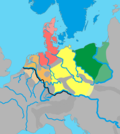 | Istvaeones (redirect from Rhine-Weser Germanic peoples) spoke a Germanic language according to modern definitions, the theory proposes that their language indirectly influenced later Germanic languages in the... 13 KB (1,630 words) - 15:23, 15 December 2023 |

